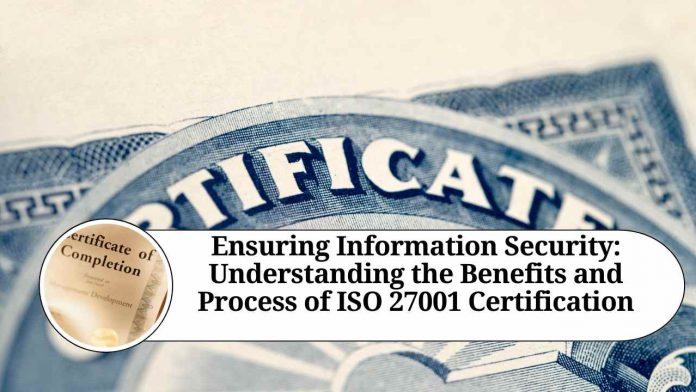ISO 27001 is a globally recognized standard for Information Security Management Systems (ISMS). It outlines a systematic approach to managing sensitive information to ensure confidentiality, integrity, and availability. Organizations that implement ISO 27001 demonstrate their commitment to protecting sensitive data and ensuring the highest level of security for their stakeholders.
ISO 27001 certification is a formal recognition that an organization has implemented an ISMS that complies with the standard. The certification is issued by an accredited third-party certification body after an assessment of the organization’s ISMS. The certification is valid for three years and requires annual surveillance audits to maintain the certification.
Benefits of ISO 27001 Certification:
- Protects sensitive data: ISO 27001 certification ensures that an organization has implemented appropriate security controls to protect sensitive data from unauthorized access, modification, or destruction.
- Compliance: Implementing ISO 27001 ensures compliance with relevant regulations, including GDPR, HIPAA, and PCI-DSS, among others. Compliance with these regulations is essential to avoid legal and financial penalties.
- Competitive Advantage: ISO 27001 certification demonstrates an organization’s commitment to information security, which can give them a competitive advantage in the marketplace. It reassures customers and stakeholders that their data is in safe hands.
- Reduced Risks: Implementing ISO 27001 reduces the risk of data breaches and cyber-attacks. It provides a framework for identifying and mitigating risks, which can help an organization avoid potential financial and reputational damage.
- Continuous Improvement: ISO 27001 requires regular assessments and reviews, ensuring that an organization’s ISMS is continually improving. This ensures that the organization is always up-to-date with the latest security threats and can respond accordingly.
The Process of ISO 27001 Certification:
- Gap Analysis: The first step in obtaining ISO 27001 certification is to conduct a gap analysis to identify areas where the organization’s existing ISMS does not meet the requirements of the standard.
- Risk Assessment: The organization must conduct a risk assessment to identify potential risks to the confidentiality, integrity, and availability of sensitive data. This assessment will help the organization identify security controls that need to be implemented to mitigate the identified risks.
- ISMS Implementation: The organization must implement an ISMS that meets the requirements of ISO 27001. The ISMS must be documented and communicated to all relevant stakeholders.
- Internal Audit: The organization must conduct an internal audit to ensure that the ISMS has been implemented correctly and is effective.
- Certification Audit: The certification audit is conducted by an accredited third-party certification body. The audit evaluates the effectiveness of the organization’s ISMS against the requirements of ISO 27001.
- Certification: If the certification audit is successful, the organization is issued an ISO 27001 certification. The certification is valid for three years and requires annual surveillance audits to maintain the certification.
In conclusion
ISO 27001 certification provides numerous benefits to an organization, including protection of sensitive data, compliance with regulations, competitive advantage, reduced risks, and continuous improvement. Organizations that implement ISO 27001 demonstrate their commitment to information security, which can enhance their reputation and credibility. Obtaining ISO 27001 certification requires a systematic approach, including a gap analysis, risk assessment, ISMS implementation, internal audit, certification audit, and certification.
Other Related Blogs: Section 144B Income Tax Act
Frequently Asked Questions (FAQs)
Q: What is ISO 27001 Certification?
A: ISO 27001 Certification is a formal recognition that an organization has implemented an Information Security Management System (ISMS) that complies with the ISO 27001 standard.
Q: What is the purpose of ISO 27001 Certification?
A: The purpose of ISO 27001 Certification is to ensure that an organization has implemented appropriate security controls to protect sensitive data from unauthorized access, modification, or destruction.
Q: Who can obtain ISO 27001 Certification?
A: Any organization that wants to demonstrate its commitment to information security can obtain ISO 27001 Certification.
Q: What are the benefits of ISO 27001 Certification?
A: The benefits of ISO 27001 Certification include protection of sensitive data, compliance with regulations, competitive advantage, reduced risks, and continuous improvement.
Q: How long does ISO 27001 Certification last?
A: ISO 27001 Certification is valid for three years and requires annual surveillance audits to maintain the certification.
Q: How do you obtain ISO 27001 Certification?
A: To obtain ISO 27001 Certification, an organization must implement an ISMS that meets the requirements of the ISO 27001 standard, conduct an internal audit, and undergo a certification audit by an accredited third-party certification body.
Q: How much does ISO 27001 Certification cost?
A: The cost of ISO 27001 Certification varies depending on the size and complexity of the organization’s ISMS and the certification body chosen for the certification audit.
Q: Is ISO 27001 Certification mandatory?
A: ISO 27001 Certification is not mandatory, but it is recommended for organizations that handle sensitive data and want to demonstrate their commitment to information security.
Q: Can ISO 27001 Certification be revoked?
A: Yes, ISO 27001 Certification can be revoked if an organization fails to comply with the requirements of the ISO 27001 standard during a surveillance audit.
Q: Can ISO 27001 Certification be transferred to another certification body?
A: Yes, ISO 27001 Certification can be transferred to another certification body as long as the organization’s ISMS meets the requirements of the ISO 27001 standard.




















